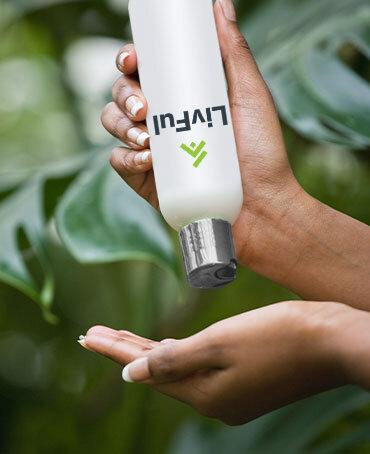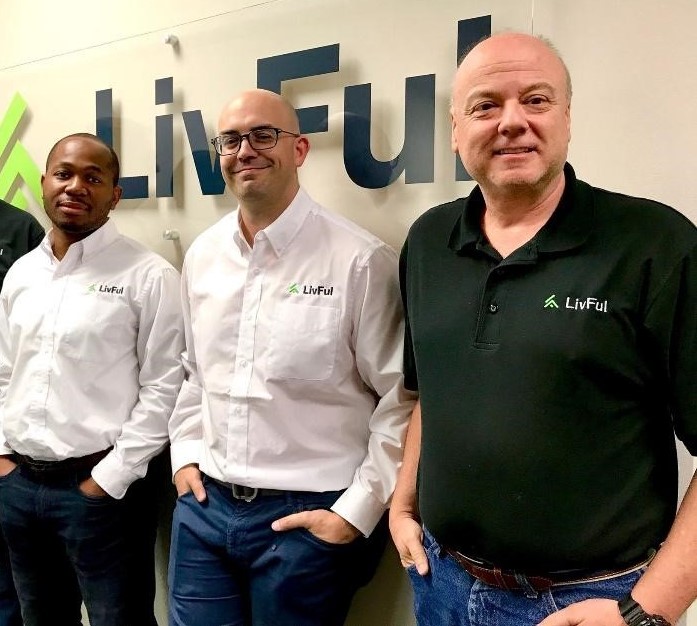Exporter Spotlight: LivFul

A Q&A interview with:
- Andy Mahler, Co-Founder & CEO, LivFul North America
County: Forsyth
Industry: Consumer Products; Healthcare; Pharmaceuticals
LivFul is a life sciences company that began with a breakthrough insect repellent and has since expanded its business to include a range of products focused on preventing and controlling infection. The company was founded in 2012 by Mahler and Hogan Bassey, whose firsthand experiences with malaria while growing up in Nigeria inspired the development of an effective and accessible repellent. Many communities, both then and now, lack adequate access to repellents and rely on bed nets or toxic whole-house sprays to combat disease carrying mosquitoes. While effective in the home, these solutions did little to protect individuals outside. LivFul’s response was to develop a long-lasting, lotion-like repellent brought to market in a way that all people have access.
How long has your company been exporting and what motivated your company to start selling internationally?
 Livful has been exporting since the very beginning. In fact, our flagship product, the Complete Insect Repellent formulation, are sold exclusively abroad. We are in the process of applying for EPA approval to sell domestically; however, the length of the application procedure in the U.S. made it more feasible for us to begin selling to international markets first. Our decision to export was also very much driven by LivFul’s mission, which is centered on providing access to life saving products that help people live to their full potential.
Livful has been exporting since the very beginning. In fact, our flagship product, the Complete Insect Repellent formulation, are sold exclusively abroad. We are in the process of applying for EPA approval to sell domestically; however, the length of the application procedure in the U.S. made it more feasible for us to begin selling to international markets first. Our decision to export was also very much driven by LivFul’s mission, which is centered on providing access to life saving products that help people live to their full potential.
To provide access, we need to make sure that we are present in markets where people really need our products. When Hogan was growing up in Nigeria, repellents existed, but people didn’t know about these products because they were inaccessible. On the other hand, in the U.S., where malaria and other diseases transmitted by mosquitoes have largely been eradicated, repellents are more about preventing the nuisance of insects rather than a tool for health protection. Through exporting, LivFul has been able to improve repellent access by deliberately bringing products to those who need it in sub-Saharan Africa and many parts of Asia, particularly Malaysia and the Philippines. Providing our product to these communities also delivers on LivFul’s mission to create a real health impact by protecting people from insect-borne diseases.
One of the reasons we consider our repellents to be a game-changer is that they last much longer than other insect repellents without using heavy chemicals or DEET. The chemical composition of our products protects consumers by reducing exposure to heavy toxins, while also offering longer lasting protection against biting insects. LivFul has focused on exporting not only to improve access to repellents for vulnerable populations, but also to provide a product that has a positive impact on the health and quality of life of our customers.

What has your export experience been?
It was difficult for us to go straight from product development to selling internationally. I took a class early on through SCORE and the Georgia Small Business Development Center’s International Trade Center, because I didn’t know much about exporting at the time. The teacher of that class worked closely with the Georgia Department of Economic Development’s (GDEcD) International Trade team and introduced me to several GDEcD contacts. We received a lot of assistance from GDEcD, an introduction to the International Representatives during their annual visit to Georgia. From those meetings, we landed our very first sale, thanks to the help of Georgia’s Trade Representative in Colombia. Having that assistance was really beneficial and helped us learn the international piece much more quickly.
We thought we were ready to export with that first international sale, but quickly realized it wasn’t that simple. What we found was that securing the deal was one thing, but filling the order was an entirely separate matter. There were numerous processes we had to maneuver, such as applying for Colombian regulatory approval and completing the required paperwork. That experience definitely taught us not to underestimate the intricacies of the export process.
What is the biggest lesson your company has learned about exporting? What advice do you have for companies that are just starting to export?

The regulatory burden of exporting has been our primary challenge, especially because our products contain chemicals, which in most countries are highly regulated. We learned that having an EPA certificate alone was not enough. Every country has distinct processes and standards that need to be followed in order to export, and companies need to invest time and money to navigate them successfully. In some cases, you might realize that exporting to a particular market is not feasible or profitable.
At LivFul, we believe there’s a market for our products virtually everywhere, but we always have to consider what it’s going to “take” to export to certain markets. Sometimes exporting will require a certified distributor, and other times a product will need to be sold directly from the manufacturer. Product categorization can also make a big difference; in some countries our repellents are classified as a cosmetic, but in others they are considered an insecticide. As a result, the regulatory requirements vary depending the classification. I would recommend that any company looking to export familiarize themselves with the regulatory requirements and processes in their target markets. Don’t underestimate the time and effort it might take to obtain approvals.
How has GDEcD’s International Trade Team helped your company?
As a startup, LivFul has really benefited from having GDEcD as a resource. After our first international sale—which was facilitated by GDEcD’s representative in Colombia—we wanted to enter the Brazilian market. At the time, Brazil was suffering from a Zika crisis, and we realized we needed a partner on the ground who could assist us. The International Trade Team helped us identify potential companies and these connections eventually led to finding representation in Brazil.
More recently, a company in Mexico expressed an interest in selling our product, but they were unable to package it. We only sell our product as bulk formula so to secure the deal we needed to find a partner in Mexico that could package the repellent for us. Our network was limited to U.S. packagers, all of whom were too expensive for the Mexican market. GDEcD helped us identify potential partners in Mexico capable of packing our product – they went as far as making the introductions, setting up calls and facilitating virtual meetings. We’re still working through the process, especially on the regulatory side, but GDEcD was again instrumental in making the necessary connections to help grow our sales channels in Mexico.
Our relationship with GDEcD has been really valuable. What I especially appreciate is that even if the International Trade Team doesn’t have the answer, they point us in the right direction. They’ve connected us with the U.S. Department of Commerce, the Small Business Development Center, the Metro Atlanta Chamber of Commerce and so many other organizations and resources that have been crucial for a startup like ours.

What has been your biggest export achievement?
In terms of export achievements, we are particularly excited about working with one of the largest pharmaceutical companies in Hong Kong. They’ve not only launched with our product, but continue to place new orders, which is a major achievement and positive indicator.
Our relationship with an NGO really highlights our mission and is a great example of how we are using exporting as a way to support independent livelihoods. A few years ago, we partnered with a U.S.-based NGO that has a presence throughout the African continent. They established a partnership with an entrepreneur in Ghana and helped him source a micro-manufacturing kit to produce insect repellent sachets. The entrepreneur has since grown his business to the point where he is buying entire drums of repellent from us and earns enough to pay himself and employ others in the community. It’s a truly self-sustaining business. These are two very different types of export achievements, but they showcase the breadth of what an export success looks like to LivFul.
How has the global COVID-19 crisis affected your company and your international business?
COVID-19 hasn’t necessarily hurt LivFul’s business, but it has certainly made distribution more difficult and much more expensive. Logistics costs have gone through the roof and scheduling has become a greater challenge with reduced frequencies of ocean and air shipments.
COVID-19 has also forced our business to pivot somewhat. We always wanted to grow the infectious disease prevention side of our business, but the ongoing health crisis really forced us to accelerate this plan, so we started selling Personal Protective Equipment (PPE). We were fortunate to get our first PPE order back in May from a multi-national NGO, despite encountering some sourcing challenges.
LivFul’s workforce is also spread around the world, so we were well adjusted to working remotely when many of the quarantine and self-isolation orders went into effect. COVID has also slowed down regulatory procedures, forcing many workers out of the office and creating delays in receiving government approvals. Much of this is out of our hands, but these delays make it that much more difficult to deliver our product to places where they can make a real difference.
####
To learn more about LivFul visit www.livful.com
Are you a Georgia business looking for help growing your international sales? Find out how Georgia’s International Trade Team can help at Georgia.org/Trade.
